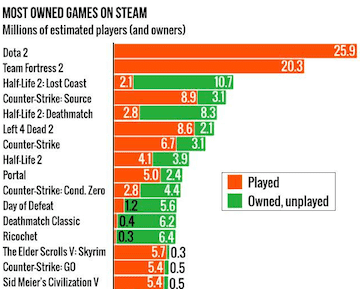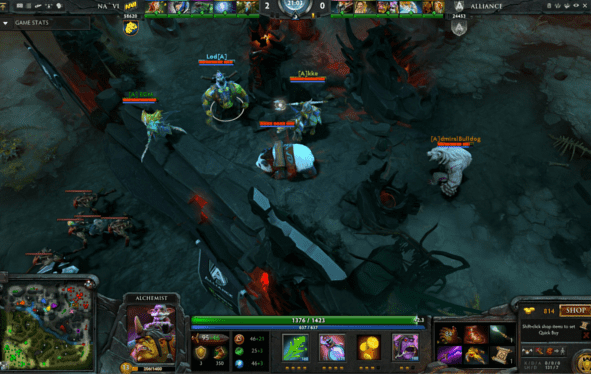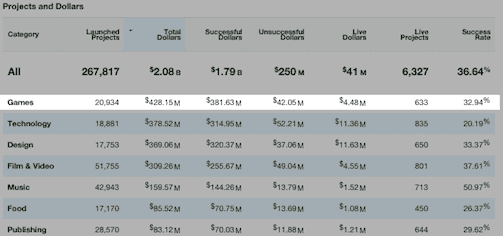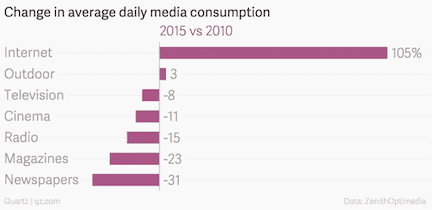The future of media is here — it’s just not evenly distributed
The success or failure of tech and media products depends on complicated interactions between products, economics, technology, and culture. It’s very hard to predict what will work and what won’t. Today, billions of people carry internet-connected supercomputers in their pockets, the largest knowledge repository in the world is a massive crowdsourced encyclopedia, and a social network is one of the 10 most valuable companies in the world. Ten years ago, someone who predicted these things would have seemed crazy.
The subtitle to this post is a variation of William Gibson’s famous remark: “The future is already here — it’s just not very evenly distributed.” An obvious follow up question is: if the future is already here, where can I find it? There is no easy answer, but history shows there are characteristic patterns. For example, it’s often useful to look at what the smartest people work on in their free time, or things that are growing rapidly but widely dismissed as toys.
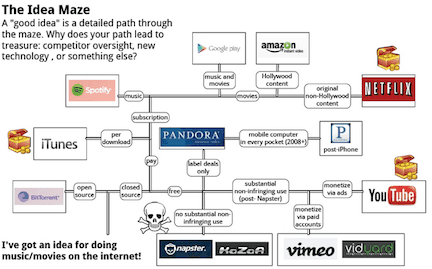
Another clue to the future is to look for communities that embrace rapid, Darwinian experimentation. Entrepreneurs are in the business of running experiments (and VCs are in the business of funding experiments). Experiments are how we collectively navigate through the startup idea maze to discover products and business models that work.
Even if you have no interest in video games, if you are interested in media, you should be interested in PC gaming. Over the past decade, PC gaming has, for a variety of reasons, become a hotbed of experimentation. These experiments have resulted in a new practices and business models — some of them surprising and counterintuitive — that provide valuable lessons for the rest of the media industry.
PC games are way bigger than you think
A lot of PC gaming happens on Valve Software’s Steam platform, which has over 125 million active users. If you aren’t a gamer, you may not have even heard of Steam, and probably haven’t heard of many it’s roughly 4,500 games, even the most popular ones.
The types of games on Steam vary widely, as do the business models. The most popular game, Dota 2, is free. It makes money selling in-app items, mostly “cosmetic items” that alter the appearance of characters.
Steam takes a revenue share (roughly 30%) from the games it hosts, and reportedly made $1.5B from its cut last year. (Valve also makes its own games, including some of Steam’s most popular games like Dota 2).
PC games are a global phenomenon. They are particularly popular in Asia, and above all in South Korea, where they are so popular that the government passed a law restricting the hours kids could play games, and runs PSAs warning about the dangers of video game addiction:

Putting the “free” back in freemium
We’re all familiar with the freemium business model popularized by companies like Dropbox: give away something useful, and then charge highly engaged users who want more storage, time, features, etc.
The PC gaming world has taken the freemium model to the extreme. In contrast to smartphone games like Candy Crush that are “free-to-play,” PC games like Dota 2 are “free-to-win.” You can’t spend money to get better at the game — that would be seen as corrupting the spirit of fair competition. (PC gamers, like South Park, generally view the smartphone gaming business model as cynical and manipulative). The things you can buy are mostly cosmetic, like new outfits for your characters or new background soundtracks. League of Legends (the most popular PC game not on Steam) is estimated to have made over $1B last year selling these kinds of cosmetic items.
PC games are so popular they can also make money from live events. Live gaming competitions have become huge: over 32M people watched the League of Legends championship this year, almost double the number of people who watched the NBA finals.
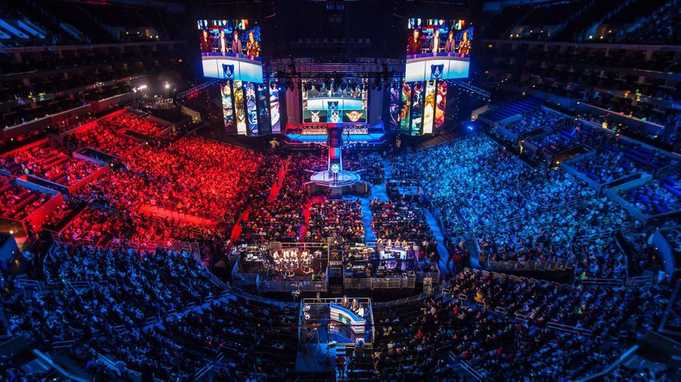
Watching these events online is free, but offline tickets cost $50–$100 each. This is similar to the trend in the music business where concerts have become an increasingly important source of income for musicians. Concert ticket prices have increased dramatically while digital music prices have dropped.
What the PC game industry figured out is that in a world of abundant media, users have endless choices; instead of fighting for scarcity, fight for attention. Maximize user engagement and money will — with enough experiments — inevitably follow.
Embracing remixes and mods
In the gaming world, “mods” are user created versions of games or elements of games. Steam has about 4500 games but about 400 million pieces of user-generated content. Dota itself was originally a user-created mod of another game, Warcraft 3.
Contrast this to the music industry, which relies on litigation to aggressively stifle remixing and experimentation. Large music labels have effectively become law firms devoted to protecting their back catalog. Sometimes this means suing their peers, and sometimes this means suing communities of users.
The end result is a strong chilling effect on new experiments. Almost all new music-related tech products are minor variations of preceding products. It’s too risky and expensive to try something genuinely new.
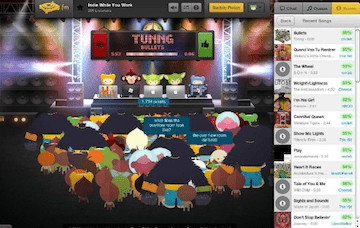
For example, one of the best music-related experiments in recent history was Turntable.fm, which invented a brand new way to curate and enjoy music.
Here’s what the founder said when the company shut down:
Ultimately, I didn’t heed the lessons of so many failed music startups. It’s an incredibly expensive venture to pursue and a hard industry to work with. We spent more than a quarter of our cash on lawyers, royalties and services related to supporting music. It’s restrictive. We had to shut down our growth because we couldn’t launch internationally. It’s a long road. It took years to get label deals in place and it also took months of engineering time to properly support them (time which could have been spent on product).
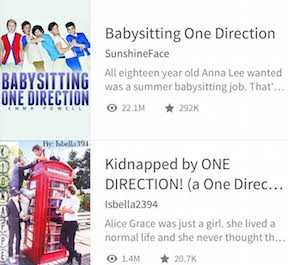
Remixing books is popular on services like Wattpad where users write fanfiction inspired by books, celebrities, movies, etc. From a legal perspective, some fanfiction could be seen as copyright or trademark infringement. From a business perspective, the book industry would be smart to learn from the PC gaming business. Instead of fighting over pieces of a shrinking pie, try to grow the pie by getting more people to read and write books.
Another form of video game remixing happens on broadcasting sites like Twitch, where you can watch live videos of people playing games (while they chat with the audience — the end result is an interesting mix between video games and talk radio).
If you ask people who watch Twitch why they do so, many will say that it’s easier and cheaper than playing the game themselves. Legally, it would probably be easy for the games industry to crack down on broadcasting, but instead they have encouraged it, seeing it as a new way to engage users and generate revenue.
Crowdfunding and user feedback
PC gaming has enthusiastically embraced crowdfunding. On Kickstarter, video games (most of of which PC games) is the highest-funded category:
And this doesn’t count all the games crowdfunded elsewhere, including the largest crowdfunding project ever: a PC game called Star Citizen that has raised over $94 million from over 1 million users.
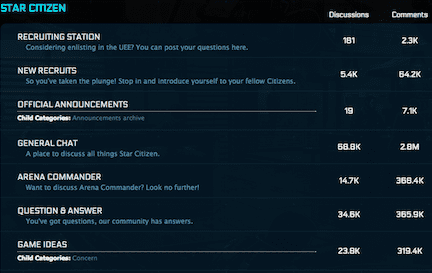
The money that comes from crowdfunding is obviously important, but just as important is the user participation it fosters. Almost all crowdfunded video game projects are accompanied by extremely active user discussion forums.
A close cousin to crowdfunding is the trend of pre-releasing games before they are finished. Minecraft is probably the most famous PC game that succeeded during pre-release, selling over a million copies while still in beta. In 2015, three of the six top selling games on Steam were pre-release (these three games were not free-to-play, which means users paid $10-$20 to buy them despite the games being incomplete and buggy). The developers get the benefit of continuous user feedback, and users get to play and contribute to games they love.
Another way to describe what’s going on here is a shift from a wholesale to a retail media model. As Buzzfeed’s Jonah Peretti says:
The big problem with traditional media is you create content and get back money, but you don’t have any relationship with the consumer that gives you back knowledge or data to get better over time. We like to be in places where the model is to have ideas and be able to test those ideas with real audiences. It’s both an art and science — you learn and get better. That means thinking of media as a service and not just a product. Tech companies tend to think of themselves as retailers where they know what is the customer doing. Traditional media company think themselves wholesalers. They will essentially sell into any window — whoever pays them the most. A retailer wants to understand the customer and wants understand their experience.
Companies like BuzzFeed pioneered the retail model for ad-supported media. The PC games industry pioneered the retail model for transaction-supported media.
Peeking into the future
Software is eating the world, and the internet is eating media:
Older forms of media — TV, movies, books, music, etc — can thrive in this new world. By 2020, four billion people worldwide will have internet-connected smartphones. The addressable market for media companies is orders-of-magnitude larger than ever before.
It is possible for companies to adapt even within industries dominated by old models. For example, Netflix has successfully applied the retail media model to an industry segment dominated by wholesalers:
“We are just a learning machine. Every time we put out a new show, we are analyzing it, figuring out what worked and what didn’t so we get better next time.” — Reed Hastings, Netflix
The internet renders business models focused on scarcity and litigation obsolete. But, as the PC gaming market shows, it also unlocks lucrative new business models, and lets creators connect with consumers in new and exciting ways.
